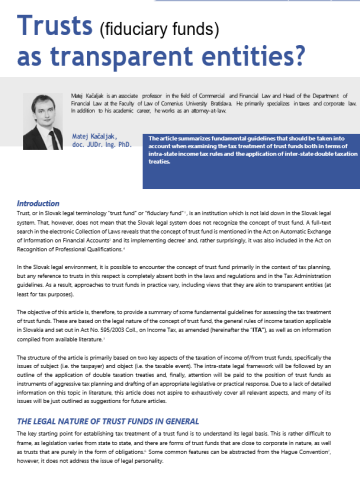Trusts (fiduciary funds) as transparent entities?
The article summarizes fundamental guidelines that should be taken into account when examining the tax treatment of trust funds both in terms of intra-state income tax rules and the application of inter-state double taxation treaties.
Introduction
Trust, or in Slovak legal terminology “trust fund” or “fiduciary fund” 1 , is an institution which is not laid down in the Slovak legal system. That, however, does not mean that the Slovak legal system does not recognize the concept of trust fund. A full-text search in the electronic Collection of Laws reveals that the concept of trust fund is mentioned in the Act on Automatic Exchange of Information on Financial Accounts2 and its implementing decree3 and, rather surprisingly, it was also included in the Act on Recognition of Professional Qualifications. 4
In the Slovak legal environment, it is possible to encounter the concept of trust fund primarily in the context of tax planning, but any reference to trusts in this respect is completely absent both in the laws and regulations and in the Tax Administration guidelines. As a result, approaches to trust funds in practice vary, including views that they are akin to transparent entities (at least for tax purposes).
The objective of this article is, therefore, to provide a summary of some fundamental guidelines for assessing the tax treatment of trust funds. These are based on the legal nature of the concept of trust fund, the general rules of income taxation applicable in Slovakia and set out in Act No. 595/2003 Coll., on Income Tax, as amended (hereinafter the “ITA”), as well as on information compiled from available literature. 5
The structure of the article is primarily based on two key aspects of the taxation of income of/from trust funds, specifically the issues of subject (i.e. the taxpayer) and object (i.e. the taxable event). The intra-state legal framework will be followed by an outline of the application of double taxation treaties and, finally, attention will be paid to the position of trust funds as instruments of aggressive tax planning and drafting of an appropriate legislative or practical response. Due to a lack of detailed information on this topic in literature, this article does not aspire to exhaustively cover all relevant aspects, and many of its issues will be just outlined as suggestions for future articles.
The full article was published in the journal for the professional public and science bulletin Slovenskej komory daňových poradcov.
Matej Kacaljak
- For the purposes of this article, the term ‘trust’ or ‘trust fund’ will be used simply because it is more widely used in practice. It can be reasonably assumed, however, that any future legislative and other official documents will use the term “zverenecký fond“ (fiduciary/trust fund) and the Slovak equivalent will come into common use.
- Act No. 359/2015 Coll., on Automatic Exchange of Information on Financial Accounts for the Purposes of Tax Administration, and on Amendments and Supplements to Certain Acts.
- Decree of the Ministry of Finance of the Slovak Republic No. 446/2015 Coll., laying down the details of the verification of financial accounts by reporting financial institutions.
- Act No. 293/2007 Coll., as amended by Act No. 560/2008 Coll. The reason for the presence of the term trust fund was that in Annex No. 3 of the Act containing the list of fields of study with a specific structure, the field of Trust Fund Administrator was listed for the State of Liechtenstein. The Act has since been repealed and replaced by Act No. 422/2015 Coll., on the Recognition of Educational Qualifications and the Recognition of Professional Qualifications and on Amendments and Supplements to Certain Acts, which no longer contains the term. This is an apt illustration that the concept of trust fund may have a completely different tradition and thus a different reputation in different jurisdictions.
- It should be noted that the topic of trust funds is very scarce in Slovak legal documents, while it can be observed that, to the contrary, academic discussions in the Czech Republic have intensified in response to the introduction of the concept of trust fund into the Czech legal system. For a brief overview of sources see KATKOVČIN, M. Perspectives of use of a trust fund as a form of investment under legal and economic conditions of the financial market in the Slovak Republic. Bratislava Law Review, 2018, 2(2), 149-15, https://doi.org/10.46282/blr.2018. 2. 2.111 and literature listed therein.




